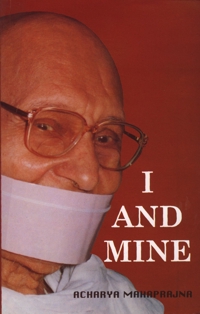
Krishna responded thus: 'Am I so weak and powerless that I should keep enduring their foul speech?'
When abused, a person as a reaction hurls abuses on the abuser only because of this thought, 'Am I weak?' One's egotism is promptly aroused followed by a reaction. Narad said that only that person can endure or show tolerance who is great:

You have to rotate the axle. One who is not great cannot tolerate. One who is not spiritual cannot tolerate. One who is not of a helping nature cannot tolerate. Are you great, spiritual and of a helping nature? A weak person can never be tolerant. Only the powerful can be tolerant. There is a curtain here behind us. Our protection from the sun and the existence of the curtain are both related. Likewise, being powerful and not getting angry are related.

Tolerance is a pre-requisite to mental peace. It is an important part of Pramod-Bhavana, which means not to be jealous of the good points of another person, but to be happy at them. Pramod-Bhavana will develop only where there is tolerance.
There was a millionaire family, which had everything conceivable. In it one person was mainly in charge of the family affairs while others assisted him. Once a thought occurred to them. This fellow merely orders about. We do real business, but he is given credit for it. Once intolerance arose, everyone separated. The result was that the chief of the family set up his own business since he was a competent person. But the others got into serious difficulty.
The thought to insult others is also born of intolerance.
Take any field of life. Can art, literature and religion progress if one artist, man of letters and religious person does not praise another artist, man of letters and religious person. People want to see happiness and peace everywhere in society. Why are happiness and peace not there? Any consideration of the above question leads directly to the political and economic disorder in the country. It is true that system has its effect on things. But it is conveniently ignored that the individual's own nature has such an effect. It amounts to being alert about the external and a kind of hide and seek with the spiritual. People do not rate spirituality high. It gives neither food, nor clothing, nor shelter. But these items are meant for man and man's development depends on spirituality. If the very person for whom things are meant does not undergo development, what good are food, clothing and shelter? Things have no intrinsic value; it is man who has it. If the mind is devoidof joy and enthusiasm but the external acquisitions are intact, the absence of the former renders everything else useless. I do not suggest that the externals be overlooked. What I do say is that special attention should be paid to man. If there is nothing that can bring happiness and equanimity to man's mind, he will become lifeless. Mind is the source of all good and evil. Cultivation of tolerance is essential for augmenting mental power. The development of mental power is the same as development of tolerance. Similarly, a decline in mental power means the decline of tolerance.Once two Pandits (learned Brahmins) visited a wealthy merchant. One of them went away for a while to attend to some work. The merchant asked the second Pandit to tell him something about the other who had temporarily withdrawn from there. The Pandit said, 'I have not known, him for long. He joined me only a little while ago, It seems he is obstinate and stupid like a bull.' When the first Pandit returned the other - had to go out for some work. The merchant asked him the same question about the other Pandit. He said, 'The other one knows nothing. He is an ass.' The merchant while serving dinner to them put cut straws before one (alleged to be an ass) and fodder before the other (alleged to be a bull). The Pandits felt insulted. The merchant said he had acted according to the introduction of each given by the other. Both the Pandits hung their heads in shame.
 Acharya Mahaprajna
Acharya Mahaprajna

